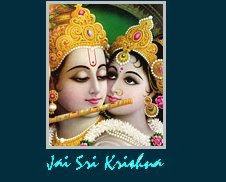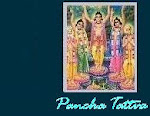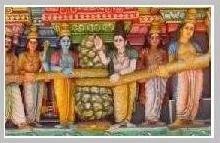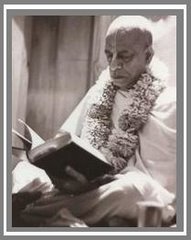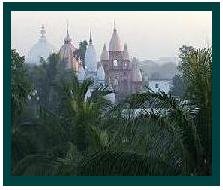 When Sri Sanatana was still young he had an unusual dream. In his dream he saw a brahmana. The brahmana gave him a Srimad-Bhagavatam. Upon receiving the Bhagavata, Sanatana's hair stood up in ecstasy. His dream broke. When he awoke and saw that the brahmana and the Bhagavata had gone, he became very depressed. The next morning, after he had bathed, while he was seated for worshiping the Lord, a brahmana appeared, carrying the Bhagavata. Standing near Sanatana, the brahmana said, "Take this Bhagavata. Always study it and all perfection will be yours." Saying this, the brahmana gave him the Bhagavata and went away. Upon receiving the treasure of the holy Bhagavata, Sri Sanatana's ecstasy knew no bounds. From that day on, Sri Sanatana would only study the Bhagavata, leaving aside other scriptures, knowing the Bhagavata to be the essence of all scriptures.
When Sri Sanatana was still young he had an unusual dream. In his dream he saw a brahmana. The brahmana gave him a Srimad-Bhagavatam. Upon receiving the Bhagavata, Sanatana's hair stood up in ecstasy. His dream broke. When he awoke and saw that the brahmana and the Bhagavata had gone, he became very depressed. The next morning, after he had bathed, while he was seated for worshiping the Lord, a brahmana appeared, carrying the Bhagavata. Standing near Sanatana, the brahmana said, "Take this Bhagavata. Always study it and all perfection will be yours." Saying this, the brahmana gave him the Bhagavata and went away. Upon receiving the treasure of the holy Bhagavata, Sri Sanatana's ecstasy knew no bounds. From that day on, Sri Sanatana would only study the Bhagavata, leaving aside other scriptures, knowing the Bhagavata to be the essence of all scriptures.Friday, September 26, 2008
Take This Bhagavata
 When Sri Sanatana was still young he had an unusual dream. In his dream he saw a brahmana. The brahmana gave him a Srimad-Bhagavatam. Upon receiving the Bhagavata, Sanatana's hair stood up in ecstasy. His dream broke. When he awoke and saw that the brahmana and the Bhagavata had gone, he became very depressed. The next morning, after he had bathed, while he was seated for worshiping the Lord, a brahmana appeared, carrying the Bhagavata. Standing near Sanatana, the brahmana said, "Take this Bhagavata. Always study it and all perfection will be yours." Saying this, the brahmana gave him the Bhagavata and went away. Upon receiving the treasure of the holy Bhagavata, Sri Sanatana's ecstasy knew no bounds. From that day on, Sri Sanatana would only study the Bhagavata, leaving aside other scriptures, knowing the Bhagavata to be the essence of all scriptures.
When Sri Sanatana was still young he had an unusual dream. In his dream he saw a brahmana. The brahmana gave him a Srimad-Bhagavatam. Upon receiving the Bhagavata, Sanatana's hair stood up in ecstasy. His dream broke. When he awoke and saw that the brahmana and the Bhagavata had gone, he became very depressed. The next morning, after he had bathed, while he was seated for worshiping the Lord, a brahmana appeared, carrying the Bhagavata. Standing near Sanatana, the brahmana said, "Take this Bhagavata. Always study it and all perfection will be yours." Saying this, the brahmana gave him the Bhagavata and went away. Upon receiving the treasure of the holy Bhagavata, Sri Sanatana's ecstasy knew no bounds. From that day on, Sri Sanatana would only study the Bhagavata, leaving aside other scriptures, knowing the Bhagavata to be the essence of all scriptures.Our Search for Sri Krishna
 We need society only to help us. If our affinity to the society keeps us down, then that should be given up, and we must march on. There is the absolute consideration and the relative consideration. When they come into clash, the relative must be given up, and the absolute should be accepted. If my inner voice, my spiritual conscience decides that this sort of company cannot really help me, then I will be under painful necessity to give them up, and to run towards my destination, wherever my spiritual conscience guides me. Any other course will be hypocrisy, and it will check my real progress.
We need society only to help us. If our affinity to the society keeps us down, then that should be given up, and we must march on. There is the absolute consideration and the relative consideration. When they come into clash, the relative must be given up, and the absolute should be accepted. If my inner voice, my spiritual conscience decides that this sort of company cannot really help me, then I will be under painful necessity to give them up, and to run towards my destination, wherever my spiritual conscience guides me. Any other course will be hypocrisy, and it will check my real progress.If we are sincere in our attempt, then no one in the world can check us or deceive us; we can only deceive ourselves (na hi kalyana-krt kascid durgatim tata gacchati ) [Bg. 6.40]. We must be true to our own selves, and true to the Supreme Lord. We must be sincere. -BRSM
Thursday, September 25, 2008
Please accept this title
The Goswamis residing in the holy site of Baghna Para mercifully bestow the title of Bhaktivinoda on the devotee and disciple Kedarnath Datta.
1. May you, our pious disciple Kedarnath Datta, who desire nothing but the lotus feet of Govinda, be ever glorious.
2. You faithfully follow the doctrines taught by our Master, Chaitanya Chandra, and you actively preach the scriptures that establish the path of devotional service.
3. Seeing your unequalled devotion for Radha and Krishna, O you who are dear to the Vaishnavas, what person in this world would not be enchanted?
4. The kind of devotion that the Lord’s dearest associates ever desire to attain is held in your heart, so you are most fortunate, O beloved servant.
5. The supreme and only benefit for the living beings is devotion to Krishna. Therefore, please accept this title of Bhaktivinoda.
The Goswamis of Baghnapara joyfully gave this honor to him in the month of Magh in the 400th year after the birth of Chaitanya Mahaprabhu.
Signed: Sri Bipin Bihari Goswami, Sri Tinkori Goswami, Sri Gopal Chandra Goswami, Sri Gaurachandra Goswami, Sri Ramachandra Goswami, Sri Yajneshwar Goswami, Sri Yadunath Goswami, Sri Binod Bihari Goswami, Sri Yogendra Chandra Goswami, Sri Hemachandra Goswami, Sri Chandra Bhushan Goswami, Sri Kanailal Goswami, Sri Haradhan Goswami.
-------------------------------------------------------
The many books that Kedar has written on the subject of bhakti are proof of his vast learning in the subject. After much research into the matter, he discovered the birthplace of Sri Chaitanya Mahaprabhu in Nabadwip Mayapur. Genuine devotees always sing his glories and only the false renouncers and cheaters criticize him. Because he is my disciple, I shall not go on and on, but have only told the essential so that everyone knows [of our relationship]. I bless him that he, his wife, children and grandchildren will all have long life and conduct their affairs for the pleasure of Krishna. May he and his wife always be engaged in the service of Krishan’s lotus feet. - BBG
The following is Bhaktivinoda’s note on the title from "Sva-likhita-jivani" (p. 176-177):
I forgot to write one thing. When the leaders of my spiritual master’s family saw the work I was doing publishing Vaishnava literature, they were pleased and gave me the title Bhaktivinoda. Here is a copy of the certificate they gave me on that occasion. (See above)
I responded to this honor and dedicated the following verses to the Goswamis of my Guru Pat.
1. I offer salutations to Sri Krishna Chaitanya Chandra. May Balaram and Krishna, the jewels of Baghna Para, the beloved deities of Jahnavi Devi and the bringers of fame to Sri Ramachandra Goswami, be ever glorious.
2. I worship the village of Baghna Para, which purifies the land of Gauda. Its spiritual power is so great that it turned even a tiger into a devotee of Krishna.
3. I also worship all the descendants of Sri Vamsivadananda Thakur, my masters and instructors in the spiritual path.
4. Through just a small fragment of their blessings, the identification of this servant with his body has disappeared and henceforth he shall be known as Bhaktivinoda.
5. By their mercy, I have been graced with this title and so I prostrate myself at their lotus feet.
Signed at Sri Rampur by Kedarnath Datta, now entitled Bhaktivinoda, the eternal servant of the descendants of Ramchandra Goswami and all the Vaishnavas.
uddharila Apana kinkara
"Krishna, known as Bipin Bihari, made his energy descend into this world as Bipin Bihari Goswami, my lord. Seeing me, his humble servant, in the dark well of worldly existence, he took the form of my spiritual master and delivered me." (Amrta-pravaha-bhasya, p. 1687)
6. I offer respectful obeisance to Sri Bilvamangala Thakur, the recipient of Lord Krishna Chaitanya’s mercy. Meditating on the holy feet of my guru Sri Bipina Bihari and Lord Hari, I am writing this Bengali translation and explanation of the Krishna Karnamritam.
7. "My exalted spiritual master, Vipina-vihari Prabhu, is the brilliant moon in the family of Sri Vamsi Vadanananda."
------------------------------------------------------
Many years later Bhaktivinode Thakur went on pilgrimage to Vrindavana (1881) at which time he met Jagannatha Dasa Babaji. The Thakur received many spiritual instructions from Babaji Maharaja and the Thakur accepted him as his instructing spiritual master (siksa-guru). Bhaktivinode referred to Jagannatha Dasa Babaji as vaisnava-sarvabhaumah, the most revered and worshipable Vaishnava.
-------------------------------------------------------
Below is a short list of Sriman Bhaktivinode Thakur's writing:
Sri Sri Kalyan Kalpa-taru
Sri Sri Navadvipa Bhava Taranga
To Love God
Sharagrahi Vaishnava
The Bhagavata
Baul Sangit
Sri Tattva-sutra
Navadvipa Bhava Taranga
Saranagati
Sri Sri Godruma Candrer Ajna
Sri Sri Sva-niyama-dasakam
Life and Precepts of Sri Chaitanya Mahaprabhu: His Life
The Glories of Sri Purusottama Month
Ajna Tahal - “Patrolling on the Lord's Command"
Sri Harinama Cintamani
Sri Sri Gitamala
Pratistha Parivarjana
Sri Dasamula-Niryas
Sri Tattva-viveka
Apasampradayer Svarupa
From Moses to Mahaprabhu
Pancha Samskara: The Process of Initiation
Sri Navadvipa Mahatmya
Sadhana
A Deliberation on the Methodology of Sadhu-sanga
-------------------------------------------------------
Below is a short list of Sriman Bhaktivinode Thakur's writing:
Sri Sri Kalyan Kalpa-taru
Sri Sri Navadvipa Bhava Taranga
To Love God
Sharagrahi Vaishnava
The Bhagavata
Baul Sangit
Sri Tattva-sutra
Navadvipa Bhava Taranga
Saranagati
Sri Sri Godruma Candrer Ajna
Sri Sri Sva-niyama-dasakam
Life and Precepts of Sri Chaitanya Mahaprabhu: His Life
The Glories of Sri Purusottama Month
Ajna Tahal - “Patrolling on the Lord's Command"
Sri Harinama Cintamani
Sri Sri Gitamala
Pratistha Parivarjana
Sri Dasamula-Niryas
Sri Tattva-viveka
Apasampradayer Svarupa
From Moses to Mahaprabhu
Pancha Samskara: The Process of Initiation
Sri Navadvipa Mahatmya
Sadhana
A Deliberation on the Methodology of Sadhu-sanga
Tuesday, September 23, 2008
Something Astounding
 “Sukadeva Goswami reveals something astounding to Pariksit Maharaja. When Krsna enters the forest of Vrndavana by the touch of the soles of His lotus feet, the earth feels the pleasure of His embrace - the personal embrace of the Sweet Absolute (vrndaranyam sva-pada-ramanam ).
“Sukadeva Goswami reveals something astounding to Pariksit Maharaja. When Krsna enters the forest of Vrndavana by the touch of the soles of His lotus feet, the earth feels the pleasure of His embrace - the personal embrace of the Sweet Absolute (vrndaranyam sva-pada-ramanam ).This is inconceivable! By the touch of the Holy Feet of Krsna, the sand and the earth feel the pleasure of consorthood! Glorified by His cowherd friends, He enters the forest of Vrndavana, and the earth, the forest, and everything that comes in connection with Him feels a higher, closer sense experience of pleasure to the happiest degree.”
An evil doer has been killed
(The Grand Festival Day Celebrating Sri Ram's killing of Ravan)
Lord Ram ordered, "Matali, drive quickly to where Ravan is staying, but at the same time be very cautious." Then, remembering that He was speaking to Indra's charioteer, Lord Ram felt embarrassed and so He apologized, "I am very sorry to have instructed you as if I were your master. It is just that I am eager to kill Ravan, so please excuse My offense."
Matali was very touched by Lord Ram's wonderful display of humility. As he maneuvered Indra's chariot close by Ravan's side, Lord Ram and his adversary began to exchange arrows. Soon, the fighting became very intense. Clouds rained blood upon Ravan's chariot, and a flock of vultures followed him from behind. A huge meteor fell nearby and so all the Rakshasas (the monster clan) became exceedingly despondent, while Ravan became convinced that he would soon die.
On the other hand, very pleasing signs appeared before Lord Ram, and so He became convinced that victory would soon be His. In the duel that followed, Lord Ram and Ravan gradually exhibited the entire wealth of their respective prowess. The competition became so intense that both armies became stunned with amazement. Indeed, all the soldiers stood motionless, just like paintings, and because they were so absorbed in watching the fight, they did not even think of attacking one another.
When Ravan tried to knock down Indra's flag, Lord Ram deflected his arrows with His own. Then, because He was determined to match Ravan, blow for blow, Lord Ram knocked down the Rakshasa King's flag. Ravan then pierced Indra's horses, but when the celestial steeds did not even stagger, he became angry and frustrated.
At last, Ravan resorted to the Rakshasa power of illusion to send forth mace-clubs, huge shuriken-discs, trees, and mountain peaks. Lord Ramchandra was able to counteract all these before they reached His chariot, and so they fell upon the army of monkeys. Lord Ram and Ravan continued to dispatch thousands of weapons at each other, and as they collided in the air, they fell down onto the battlefield. In this way, the fighting continued for about an hour. Lord Ram matched Ravan, blow for blow, while all created beings looked on, their minds astonished with wonder.
Both drivers also displayed great skill. But, when the chariots came side by side, Lord Ram forced Ravan's four horses to turn away by piercing them with four arrows. This incited Ravan's anger, and so he repeatedly pierced Lord Ram in retaliation. Lord Ram remained undisturbed, and thereafter, the exchange of all varieties of weapons became so feverish, that the fighting that took place was unparalleled in the history of warfare.
Sometimes Ravan fought in his ten-headed feature, and at other times he fought in his normal form, having one head. On one occasion, Lord Ram managed to sever Ravan's head with an arrow. But, as that head fell to the ground, a duplicate one miraculously cropped up in its place. Lord Ram then severed that head, but once again, another one immediately manifested itself as a replacement. Again and again Lord Ram cut off Ravan's head, until, altogether one hundred such heads lay on the battlefield.
Because each time a new head appeared to replace the old one, Lord Ram began to wonder, "With these arrows I formerly killed Maricha, Khara and Viradha. I pierced seven Sal trees and killed the invincible Vali. These arrows had humbled great mountains and agitated the fathomless sea. How is it that they are now ineffectual against Ravan?"
The duel continued at a furious pace. Both combatants were obsessed with the desire for killing the other. In fact, several days and nights passed without any break in the fighting.
At last, when Matali saw that Lord Ram was not gaining His desired victory, he inquired, "Why are you simply fighting defensively? My Lord, are You not aware of Your limitless potencies? The hour of doom has now arrived for the King of the Rakshasas. Why don't You employ the divine brahmastra?" Being thus reminded of this ultimate weapon, Lord Ram picked up the arrow that Agastya Rishi had formerly given Him at the time of their meeting in the Dandaka forest. That arrow had been constructed personally by Lord Brahma for Indra's use, and later on it was presented to Agastya. Garuda supplied the feathers of that wonderful arrow and the sharp head combined the energy of the Firegod, Agni, and the Sungod. Mount Meru and Mount Mandara contributed their gravity to the arrow's weight, and its shaft was made from the subtle ethereal element.
This brahmastra weapon was omnipotent and infallible, and its dazzling effulgence made it rival the splendor of the sun. After empowering the brahmastra with the required mantras, Lord Ram placed it upon His bowstring. As the monkeys gazed upon that flaming arrow, their hearts became filled with delight, while a dreadful fear penetrated the cores of the hearts of all the Rakshasas.
 As Lord Ram pulled the bowstring back to His ear, the earth trembled and the heavens also appeared to become disturbed. When Lord Ram released the brahmastra, it sped through the air like death itself, and then violently fell upon the chest of the wicked Ravan. After piercing right through the King of the Rakshasa's heart, that effulgent arrow entered deep into the earth, taking his sinful life along with it. As that awesome brahmastra came and re-entered Lord Ram's quiver, Ravan dropped the bow from his hand and fell down dead from his chariot.
As Lord Ram pulled the bowstring back to His ear, the earth trembled and the heavens also appeared to become disturbed. When Lord Ram released the brahmastra, it sped through the air like death itself, and then violently fell upon the chest of the wicked Ravan. After piercing right through the King of the Rakshasa's heart, that effulgent arrow entered deep into the earth, taking his sinful life along with it. As that awesome brahmastra came and re-entered Lord Ram's quiver, Ravan dropped the bow from his hand and fell down dead from his chariot.
Matali was very touched by Lord Ram's wonderful display of humility. As he maneuvered Indra's chariot close by Ravan's side, Lord Ram and his adversary began to exchange arrows. Soon, the fighting became very intense. Clouds rained blood upon Ravan's chariot, and a flock of vultures followed him from behind. A huge meteor fell nearby and so all the Rakshasas (the monster clan) became exceedingly despondent, while Ravan became convinced that he would soon die.
On the other hand, very pleasing signs appeared before Lord Ram, and so He became convinced that victory would soon be His. In the duel that followed, Lord Ram and Ravan gradually exhibited the entire wealth of their respective prowess. The competition became so intense that both armies became stunned with amazement. Indeed, all the soldiers stood motionless, just like paintings, and because they were so absorbed in watching the fight, they did not even think of attacking one another.
When Ravan tried to knock down Indra's flag, Lord Ram deflected his arrows with His own. Then, because He was determined to match Ravan, blow for blow, Lord Ram knocked down the Rakshasa King's flag. Ravan then pierced Indra's horses, but when the celestial steeds did not even stagger, he became angry and frustrated.
At last, Ravan resorted to the Rakshasa power of illusion to send forth mace-clubs, huge shuriken-discs, trees, and mountain peaks. Lord Ramchandra was able to counteract all these before they reached His chariot, and so they fell upon the army of monkeys. Lord Ram and Ravan continued to dispatch thousands of weapons at each other, and as they collided in the air, they fell down onto the battlefield. In this way, the fighting continued for about an hour. Lord Ram matched Ravan, blow for blow, while all created beings looked on, their minds astonished with wonder.
Both drivers also displayed great skill. But, when the chariots came side by side, Lord Ram forced Ravan's four horses to turn away by piercing them with four arrows. This incited Ravan's anger, and so he repeatedly pierced Lord Ram in retaliation. Lord Ram remained undisturbed, and thereafter, the exchange of all varieties of weapons became so feverish, that the fighting that took place was unparalleled in the history of warfare.
Sometimes Ravan fought in his ten-headed feature, and at other times he fought in his normal form, having one head. On one occasion, Lord Ram managed to sever Ravan's head with an arrow. But, as that head fell to the ground, a duplicate one miraculously cropped up in its place. Lord Ram then severed that head, but once again, another one immediately manifested itself as a replacement. Again and again Lord Ram cut off Ravan's head, until, altogether one hundred such heads lay on the battlefield.
Because each time a new head appeared to replace the old one, Lord Ram began to wonder, "With these arrows I formerly killed Maricha, Khara and Viradha. I pierced seven Sal trees and killed the invincible Vali. These arrows had humbled great mountains and agitated the fathomless sea. How is it that they are now ineffectual against Ravan?"
The duel continued at a furious pace. Both combatants were obsessed with the desire for killing the other. In fact, several days and nights passed without any break in the fighting.
At last, when Matali saw that Lord Ram was not gaining His desired victory, he inquired, "Why are you simply fighting defensively? My Lord, are You not aware of Your limitless potencies? The hour of doom has now arrived for the King of the Rakshasas. Why don't You employ the divine brahmastra?" Being thus reminded of this ultimate weapon, Lord Ram picked up the arrow that Agastya Rishi had formerly given Him at the time of their meeting in the Dandaka forest. That arrow had been constructed personally by Lord Brahma for Indra's use, and later on it was presented to Agastya. Garuda supplied the feathers of that wonderful arrow and the sharp head combined the energy of the Firegod, Agni, and the Sungod. Mount Meru and Mount Mandara contributed their gravity to the arrow's weight, and its shaft was made from the subtle ethereal element.
This brahmastra weapon was omnipotent and infallible, and its dazzling effulgence made it rival the splendor of the sun. After empowering the brahmastra with the required mantras, Lord Ram placed it upon His bowstring. As the monkeys gazed upon that flaming arrow, their hearts became filled with delight, while a dreadful fear penetrated the cores of the hearts of all the Rakshasas.
 As Lord Ram pulled the bowstring back to His ear, the earth trembled and the heavens also appeared to become disturbed. When Lord Ram released the brahmastra, it sped through the air like death itself, and then violently fell upon the chest of the wicked Ravan. After piercing right through the King of the Rakshasa's heart, that effulgent arrow entered deep into the earth, taking his sinful life along with it. As that awesome brahmastra came and re-entered Lord Ram's quiver, Ravan dropped the bow from his hand and fell down dead from his chariot.
As Lord Ram pulled the bowstring back to His ear, the earth trembled and the heavens also appeared to become disturbed. When Lord Ram released the brahmastra, it sped through the air like death itself, and then violently fell upon the chest of the wicked Ravan. After piercing right through the King of the Rakshasa's heart, that effulgent arrow entered deep into the earth, taking his sinful life along with it. As that awesome brahmastra came and re-entered Lord Ram's quiver, Ravan dropped the bow from his hand and fell down dead from his chariot.Sunday, September 21, 2008
 I want that those who come here (Vrndavana), whether grhasthas or sannyasis, behave on the level of real gosvamis.
I want that those who come here (Vrndavana), whether grhasthas or sannyasis, behave on the level of real gosvamis.Gosvami means controlling the senses and always glorifying Krsna by varieties of engagement in devotional service.
(AC Bhaktivedanta Swami .... Letter, 23 March 1974)
Wherever he may be, one must always think about life in Vraja-dhama and about following in the footsteps of a particular devotee in the service of the Lord.
(AC Bhaktivedanta Swami .... Nectar of Devotion Ch. 16)
Subscribe to:
Posts (Atom)



